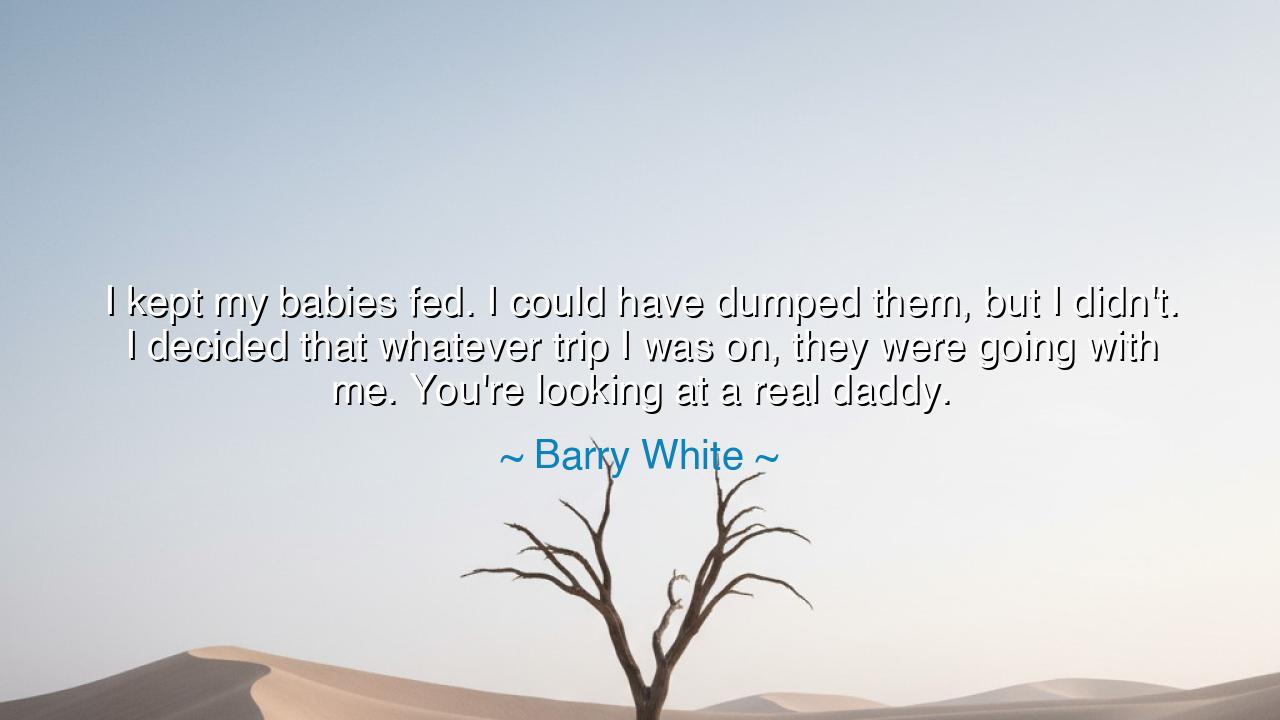
I kept my babies fed. I could have dumped them, but I didn't. I
I kept my babies fed. I could have dumped them, but I didn't. I decided that whatever trip I was on, they were going with me. You're looking at a real daddy.






In the words of Barry White, “I kept my babies fed. I could have dumped them, but I didn’t. I decided that whatever trip I was on, they were going with me. You’re looking at a real daddy.” In this declaration rings the voice of a man who knew both struggle and redemption — a man who understood that fatherhood is not a title given by blood alone, but a sacred commitment forged in responsibility, sacrifice, and love. His words are not polished poetry, but the raw rhythm of truth — the song of a soul that chose duty over escape, presence over absence. To “keep one’s babies fed” is more than an act of survival; it is the fulfillment of a divine obligation, a vow that echoes through generations.
The origin of this quote lies in the life of Barry White himself, the deep-voiced maestro of soul and love. Before the fame, before the orchestras and velvet tones, he was a man shaped by hardship — raised in poverty in Los Angeles, jailed as a teenager, and faced with the weight of responsibility at an early age. When he became a father, he could have fled, as many do when life’s burdens grow too heavy. But instead, he chose to stay. He chose to raise his children, to feed them, to bring them along on his journey — not as baggage, but as blessings. In that choice lies the essence of manhood: not the strength to conquer others, but the strength to care for one’s own.
To the ancients, such devotion would have been the mark of a hero. For they understood that the greatest battles are not always fought with swords, but with the heart. The Roman philosopher Seneca wrote that true greatness lies in self-mastery and responsibility. And in the myths of old, the father who protects his children — like Odysseus, who endured the wrath of the sea to return to his family — was seen as a symbol of endurance and love. Barry White’s words belong to that lineage of heroes. His battlefield was not Troy, but the streets and stages of life. His victory was not over an enemy, but over the temptation to abandon those who depended on him.
The phrase “whatever trip I was on, they were going with me” speaks to the unity of family — the refusal to divide one’s destiny from one’s loved ones. In every age, the world tempts the ambitious soul to sacrifice relationships for success. But Barry, whose life became a symphony of sensuality and sound, never left his children behind. He saw his art and his fatherhood not as separate paths, but as one journey. To bring one’s family along through both storm and sunlight is an act of courage — to declare that love will not be left at the roadside while one pursues dreams. This is what it means, in his words, to be a “real daddy.”
Consider the example of Nelson Mandela, who, though imprisoned for twenty-seven years, carried the image of his children in his heart. When he emerged from captivity, he embraced them not with regret, but with renewed purpose. Like Barry White, Mandela understood that being a father does not mean perfection, but perseverance. Both men, in their own ways, lived the same truth: that a parent’s love is measured not by circumstance, but by consistency — by the refusal to abandon those who look to them for life.
The wisdom in Barry White’s words also speaks beyond fathers — to anyone who carries the responsibility of care. To feed another, whether a child, a friend, or a dream, is to act in defiance of despair. It is to nurture something fragile until it grows strong. The modern world, obsessed with self-interest, often forgets this truth. But Barry reminds us that love’s truest form is stewardship — to lift others even when one’s own feet are weary.
The lesson, then, is both powerful and clear: do not walk away from what you have created. Whether it is a child, a relationship, a work of art, or a promise — see it through. To be “a real daddy,” in Barry’s sense, is to be steadfast — to keep your commitments alive when it would be easier to let them die. Happiness and peace come not from freedom alone, but from the bonds we choose to honor.
So remember this, O listener: greatness is not in the applause of strangers, but in the quiet moments when you show up — when you choose love over escape, faithfulness over convenience. Be the one who keeps others fed — with food, with hope, with strength. For in doing so, you become what Barry White declared with pride: “a real daddy” — one who not only gives life, but sustains it, and through that love, leaves a legacy that never fades.






AAdministratorAdministrator
Welcome, honored guests. Please leave a comment, we will respond soon